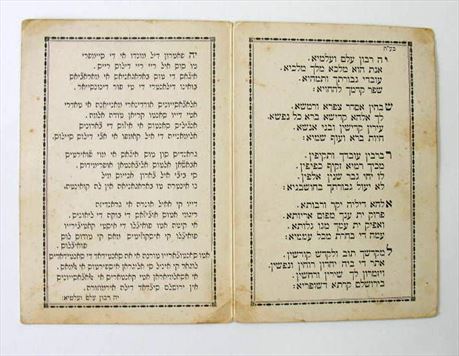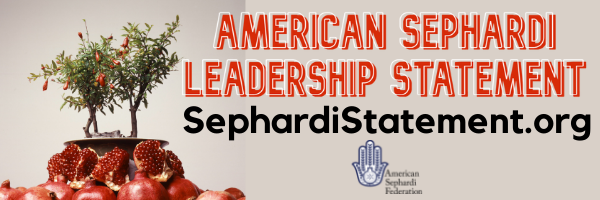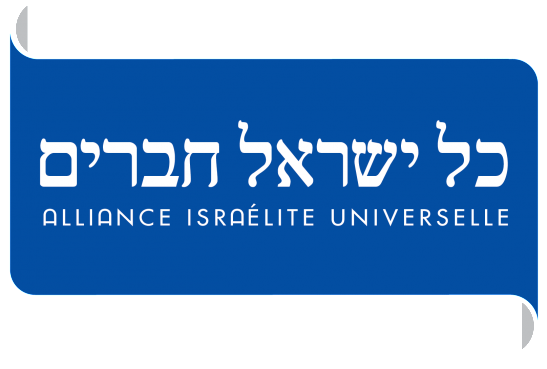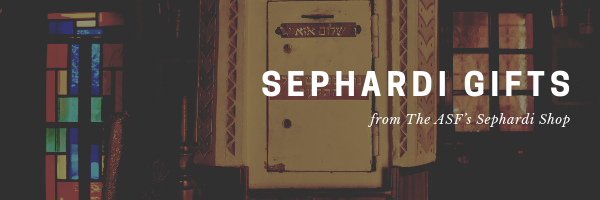
The American Sephardi Federation’s Sephardi Ideas Monthly for September 2021 is dedicated in honor of Distinguished ASF Board Member Joel Marcus, who will serve this Shabbat Bereshit as Hatan Torah at Congregation Shearith Israel, New York’s Spanish & Portuguese Synagogue
Click here to dedicate a future issue in honor or memory of a loved one

The ASF’s Sephardi Ideas Monthly is a continuing series of essays and interviews from the rich, multi-dimensional world of Sephardi thought and culture that is delivered to your inbox every month.
Continuing the theme of last month’s SIM (“Sephardi Gaza: Unlearning Jewish History”), we are diving into the poetry and music of the great payytan of Gaza, R’ Yisrael Najara (1555-1625), with Prof. Tova Be’eri’s exploration of Najara’s piyyut, Bin Tavinu Liqnot Bina Ha’azinu. Prof. Be’eri is Professor Emeritus in the Department of Literature at Tel Aviv University.
The brave soul who would translate the rhythmic wisdom of Najara’s title into English has yet to appear. It is, in short, a call to acquire wisdom and to listen. Which is amusing, because, “Rabbi Yisrael Najara wrote this wonderful and virtuosic song according to the structure, rhyming pattern and spirit of ‘The drunken woman,’” a Judeo-Spanish song, “in which a man is trying to appease his drunken wife with various presents, and she rejects all of them with all kinds of excuses. Finally, only the wine barrel appeases her.”
The musical dimension of Najara’s work must also be kept clearly in mind. He wrote poems, rich textual tapestries. But he wrote them to be sung.
Included in this month’s featured article is a musical reconstruction of Bin Tavinu Liqnot Bina Ha’azinu. In November, 2009, a concert, “Rabbi Yisrael Najara- the Original Versions,” was held as part of the International Jerusalem ‘Oud Festival, and this song was included in the performance:
“This concert, a first of its kind, was an attempt to restore some melodies, which according to the researchers’ estimates, reflect the original musical intentions of Najara, or at least the spirit of his intentions. This was made possible by cross-checking information brought by Najara, with findings from the research of the oral tradition of the Sephardic Jews of the Eastern Mediterranean.”
The band included top-notch Israeli musicians Eran Tsur, Elad Gabay, Yair Harel, and Rali Margalit. Gabay, Harel and Margalit come from the Sephardi tradition, while Tsur plays rock. The result is, “a unique fusion of… east and west.”
It’s also pretty catchy. Najara’s piyyut follows the model of the original in which we recount, one by one, the drunken wife’s demands but add a new demand each verse. In Najara’s spirited reimagining of the song, we recount terms taken from the building of the holy mishkan (tabernacle) in the desert, with Najara playfully helping himself to new material from the tabernacle each verse in order to present an ever-growing list of material things that one should… avoid while pursuing wisdom.
Sephardi Ideas Monthly is very happy to introduce our readers to one of Israel’s great payytanim and arguably the most outstanding figure in Gazan Jewish history, R’ Yisrael Najara, with Tova Be’eri’s article, Bin Tavinu Liqnot Bina Ha’azinu.
~~~~~~~

The American Sephardi Federation invites all individuals, communities, and organizations who share our vision & principles to join us in signing the American Sephardi Leadership Statement!
Please also support the ASF with a generous, tax-deductible contribution so we can continue to cultivate and advocate, preserve and promote, as well as educate and empower! Donate now!
~~~~~~~

The Monthly Sage החכם החודשי

Born to Malkona and Raphael David in Kushta (now Istanbul), Turkey, Hakham Baruch Yerushalmi made Aliyah to Israel late in life, and passed away in 1899.
His book, Baruch MeBanim, includes original commentary on the Torah, Prophets and Writings. It was posthumously printed by the President of the Jerusalem Rabbinic Court, Hakham Bechor Aharon Elnekave, in response to Hakham Baruch’s request in his will that his book be published. He had no sons who could do so.
Hakham Baruch Yerushalmi wrote an additional book on Maimonides and Responsa, which remains in manuscript form.
In the following passage from Baruch MeBanim, Hakham Baruch displays literary and psychological sensitivity in equal measure in interpreting Proverbs, 31:20:
“She gives generously to the poor; Her hands are stretched out to the needy”.
The differentiation between ‘poor’ and ‘needy’ is known; poor refers to someone who has never in his life seen “lights” [money] while a needy person is one who was once wealthy but has since lost his fortune. The latter is familiar with the taste of all things and feels cravings, and is therefore modest and embarrassed to take even a little charity, all the more so publicly.
That is the meaning of “She gives generously to the poor; Her hands are sent out to the needy” – she is punctilious when giving charity. When it concerns a poor person, who was born poor and does not care – she gives charity overtly, even if only a small amount. However, concerning the needy person, who is modest about his poverty and has cravings, it says “Her hands are stretched out to the needy”, meaning that she gives him a portion worthy of being taken with two hands; “stretched” [also means ‘sent’] implies that she gives in a modest way and sends him on his way. Such a woman, who is so precise in her action, “…is not worried for her household because of snow.
~~~~~~~

A Pizmonim: Sephardic-Hebrew Songs of the Middle East, Volume 1
By David Elihu Cohen
Pizmonim, a unity of poetry and song, have been an integral part of the Jewish People and may be traced in the Bible to the very beginning of our history.
The twelve selected Pizmonim contained in this booklet serve to perpetuate the Greater Sephardic culture and tradition of singing praise to the Lord on all joyous occasions.
Mystic Siren: Woman’s Voice in the Balance of Creation
By Dr. Vanessa Paloma Duncan-Elbaz (ASF Broome & Allen Fellow)
Mystic Siren is about women’s spirituality, Jewish mysticism, and Sephardic musical and cultural traditions. Beautifully illustrated by Gloria Abella Ballen, an award-winning artist recognized by the National Endowment for the Arts, Mystic Siren is a unique artistic and scholarly collaboration between a talented mother and daughter team.
“This little book is an unusual mix of fable and spiritual wisdom that will elevate and enrich the reader, even the parent who is reading to the child.” ~David Suissa
“Vanessa Paloma… is a passionate scholar and performer of songs from the Sephardic Diaspora from North Africa to Turkey…” ~National Public Radio
“Paloma…brings this richness of heritage to her work as an author, performer, teacher and preserver of Ladino songs and music.” ~Here & There, Hadassah Magazine
~~~~~~~
Upcoming Events or Opportunities
The ASF Institute of Jewish Experience presents:
New Works Wednesday with
Michal Ben Ya’akov and Noam Sienna
Join Professor Michal Ben Ya’akov and Dr. Noam Sienna as they discuss their research from the new book Jews and Muslims in Morocco: Their Intersecting Worlds.
Wednesday, 6 October
@ 9AM PDT ◊ 12PM EDT ◊ 5PM London ◊ 7PM Jerusalem ◊ 8PM Dubai
Sign-up Now!
(Free Admission, registration required)

About Jews and Muslims in Morocco:
Multiple traditions of Jewish origins in Morocco emphasize the distinctiveness of Moroccan Jewry as indigenous to the area, rooted in its earliest settlements and possessing deep connections and associations with the historic peoples of the region. The creative interaction of Moroccan Jewry with the Arab and Berber cultures was noted in the Jews’ use of Morocco’s multiple languages and dialects, characteristic poetry, and musical works as well as their shared magical rites and popular texts and proverbs. In Jews and Muslims in Morocco: Their Intersecting Worlds historians, anthropologists, musicologists, Rabbinic scholars, Arabists, and linguists analyze this culture, in all its complexity and hybridity. The volume’s collection of essays span political and social interactions throughout history, cultural commonalities, traditions, and halakhic developments. As Jewish life in Morocco has dwindled, much of what is left are traditions maintained in Moroccan ex-pat communities, and memories of those who stayed and those who left. The volume concludes with shared memories from the perspective of a Jewish intellectual from Morocco, a Moroccan Muslim scholar, an analysis of a visual memoir painted by the nineteenth-century artist, Eugène Delacroix, and a photo essay of the vanished world of Jewish life in Morocco.
Purchase the book here!
About the Speakers:
Michal Ben Ya’akov is an associate professor of history at Efrata College of Education.
Dr. Noam Sienna is a scholar of Jewish culture and history, a Jewish educator, and a Hebrew calligrapher and book artist.
Sponsorship opportunities available:
info@americansephardi.org
====
The ASF Institute of Jewish Experience presents:
Mizrahi Dance Series with Jackie Barzvi
Join the ASF Institute of Jewish Experience and Jackie Barzvi, creator of the Mizrachi Dance Archive, for a three-part series highlighting the history and movements of Mizrahi dance! Jackie will focus on three different Greater Sephardi styles: Moroccan, Bukharian, and Yemenite dances.
Each session will be both a lecture and dance class, and participants will learn about the history of each community, gain insight into how dance was included in their traditions, listen to Jewish music from each region, practice traditional movements, and so much more!
The workshops will be held via Zoom and all are welcomed.
No previous dance experience required.
On Sundays
10 October
17 October
24 October
@ 9AM PDT ◊ 12PM EDT ◊ 5PM London ◊ 7PM Jerusalem ◊ 8PM Dubai
Sign-up Now!

About Jackie Barzvi:
Jackie Barzvi is a professional raqs sharqi (belly dance) performer and instructor. She recently created the first ever Mizrachi Dance Archive to highlight specific Jewish dances from the Middle East and North African regions. Jackie was also the IACT Israel Programs Coordinator at Northeastern University Hillel in Boston, and has led over a dozen organized trips to Israel. Jackie is passionate about helping others find their unique Jewish identity and creating environments where people can dance, connect, and build community. To learn more about her work visit the archive at mizrachidancearchive.com
Sponsorship opportunities available:
info@americansephardi.org
===
The ASF Institute of Jewish Experience presents:
New Works Wednesday with
Bart Wallet and David Wertheim
Join us for a New Works Wednesday with Bart Wallet and David Wertheim, two editors of the new book “Reappraising the History of the Jews in the Netherlands.”
Wednesday, 13 October
@ 9AM PDT ◊ 12PM EDT ◊ 5PM London ◊ 7PM Jerusalem ◊ 8PM Dubai
Sign-up Now!
(Free Admission, registration required)

About the book:
The two decades since the last authoritative general history of Dutch Jews was published have seen such substantial developments in historical understanding that a new assessment has become an imperative. This volume offers an indispensable survey from a contemporary viewpoint that reflects the new preoccupations of European historiography and allows the history of Dutch Jewry to be more integrated with that of other European Jewish histories. Historians from both older and newer generations shed significant light on all eras, providing fresh detail that reflects changed emphases and perspectives.
In addition to such traditional subjects as the Jewish community’s relationship with the wider society and its internal structure, its leaders, and its international affiliations, new topics explored include the socio-economic aspects of Dutch Jewish life seen in the context of the integration of minorities more widely; a reassessment of the Holocaust years and consideration of the place of Holocaust memorialization in community life; and the impact of multiculturalist currents on Jews and Jewish politics. Memory studies, diaspora studies, and postcolonial studies all play their part in providing the fullest possible picture.
Available at liverpooluniversitypress.co.uk
About the Editors:
Bart T. Wallet is Professor of Jewish History at the University of Amsterdam.
David J. Wertheim is the director of the Menasseh ben Israel Institute for Jewish Social and Cultural Studies, Amsterdam.
Sponsorship opportunities available:
info@americansephardi.org
===
The ASF Institute of Jewish Experience presents:
Museum Mondays:
The Museum for Islamic Art, Jerusalem
Tour the Museums from the comfort of your own home with Nachliel Selavan, the Museum Guy.
On Mondays
18 October
The Museum for Islamic Art, Jerusalem
Sign-up Now!
8 November
A Hanukah Tour Through Ancient Greece – Greek Exhibits in Museums Around the World
Sign-up Now!
10 January
Tour the Babylonian Jewry Heritage Center in Or Yehuda
Sign-up Now!
(Registration required for each session)
@ 9AM PDT ◊ 12PM EDT ◊ 5PM London ◊ 7PM Jerusalem ◊ 8PM Dubai

About Your Tour Guide:
Nachliel Selavan created and delivered an integrated learning and museum tour program for both school and adult educational settings at the Metropolitan Museum of Art, and has hosted similar pilot visits to a dozen museums in North America, and a few museums in Europe and in Jerusalem. He also teaches and engages audiences through virtual tours and social media. He has recently completed a year long Tanach Study podcast called Parasha Study Plus, delivering a weekly episode of Archaeology on the Parasha, and is now on his second podcast and a new video series reviewing every book in Tanach, called Archaeology Snapshot.
Sponsorship opportunities available:
info@americansephardi.org
===
The ASF Institute of Jewish Experience presents:
The World Should Know:
First Steps in Writing Your Memoir
Each of us has a story to tell, we just need the impetus to get started!
Join award-winning author Gila Green in a hands on workshop to begin writing yours or your family’s story.
Writing a memoir is both for you and for future generations.
Begin today!
Thursday, 21 October
@ 9AM PDT ◊ 12PM EDT ◊ 5PM London ◊ 7PM Jerusalem ◊ 8PM Dubai
Sign-up Now!

About Gila Green:
Canadian author Gila Green is an Israel-based writer, editor, and EFL teacher.
Sponsorship opportunities available:
info@americansephardi.org
===
The American Sephardi Federation, the Jazz Leadership Project, and the Combat Antisemitism Movement present:
Combating Racism and Antisemitism Together:
Shaping an Omni-American Future
Join artists, thinkers, and musicians who will offer perspectives on how to build a shared “Omni-American” future free of racism and antisemitism.
24-25 October 2021
(Digital Event)

The term “Omni-American” is borrowed from the writings of Albert Murray, the great 20th century Black American thinker and writer who, together with his good friend and celebrated novelist, Ralph Ellison, extolled America’s pluralistic and “incontestably mulatto” culture. By robustly critiquing racial essentialism and strongly emphasizing the power of culture instead of race, Murray and Ellison’s writings strike at the root of ideologies that foster division, manipulation, and hatred, and ultimately develop into Antisemitism and Racism.
Sponsorship opportunities available:
info@americansephardi.org
===
The ASF Institute of Jewish Experience presents:
New Works Wednesday with
Andre Elbaz and Edwin Seroussi
Join us for a discussion with three researchers featured in the book Jews and Muslims in Morocco: Their Intersecting Worlds.
Wednesday, 27 October
@ 9AM PDT ◊ 12PM EDT ◊ 5PM London ◊ 7PM Jerusalem ◊ 8PM Dubai
Sign-up Now!
(Free Admission, registration required)

About the book:
Multiple traditions of Jewish origins in Morocco emphasize the distinctiveness of Moroccan Jewry as indigenous to the area, rooted in its earliest settlements and possessing deep connections and associations with the historic peoples of the region. The creative interaction of Moroccan Jewry with the Arab and Berber cultures was noted in the Jews’ use of Morocco’s multiple languages and dialects, characteristic poetry, and musical works as well as their shared magical rites and popular texts and proverbs. In Jews and Muslims in Morocco: Their Intersecting Worlds historians, anthropologists, musicologists, Rabbinic scholars, Arabists, and linguists analyze this culture, in all its complexity and hybridity. The volume’s collection of essays span political and social interactions throughout history, cultural commonalities, traditions, and halakhic developments. As Jewish life in Morocco has dwindled, much of what is left are traditions maintained in Moroccan ex-pat communities, and memories of those who stayed and those who left. The volume concludes with shared memories from the perspective of a Jewish intellectual from Morocco, a Moroccan Muslim scholar, an analysis of a visual memoir painted by the nineteenth-century artist, Eugène Delacroix, and a photo essay of the vanished world of Jewish life in Morocco.
Purchase the book here!
About the Speakers:
André Elbaz is a professor emeritus of French at Carleton University.
Edwin Seroussi is a professor of musicology and director of the Jewish Music Research Centre at Hebrew University of Jerusalem.
Sponsorship opportunities available:
info@americansephardi.org
===
The ASF Institute of Jewish Experience presents:
At the Crossroads:
Provençal Jewish Culture in the Middle Ages
Monday, 1 November
@ 9AM PDT ◊ 12PM EDT ◊ 5PM London ◊ 7PM Jerusalem ◊ 8PM Dubai
Sign-up Now!

The medieval Jewish community of Provence sat at the crossroads of Ashkenaz and Sefarad, a meeting place of diverse ideas and a center of innovative thought. Provençal Jews were renowned for their masterpieces of Talmudic learning as well as groundbreaking works of philosophy and science. It was in Provence that the treasures of Judeo-Arabic learning were translated into Hebrew, from which they were handed down to us today. This distinct blend of traditional and worldly knowledge characterized Provence. Its denizens saw themselves as belonging to a unique regional culture and proudly recorded its customs in books of minhagim and its version of the liturgy. With the French expulsions of the fourteenth century, Provençal Jewish culture was dispersed, but it did not come to a halt. Everywhere that members of this community went, they carried with them their distinctive approach to Jewish life, and their influence is felt into modernity.
About the speaker:
Dr. Tamar Marvin is a scholar of medieval Jewish intellectual history and a semikha student at Yeshivat Mahrat. She holds a Ph.D. in Jewish Studies from the Jewish Theological Seminary and a B.A. in Literature and Journalism from New York University. Dr. Marvin has taught and developed curricula in a variety of academic and Jewish settings, including American Jewish University and Hebrew Union College-JIR, Los Angeles. She has published her work in academic journals as well as writing for broader media. Dr. Marvin’s research centers on questions of how medieval Jews reacted to and creatively adapted new forms of meaning-making in the world they encountered around them, including both philosophical reflection and Kabbalistic speculation.
Sponsorship opportunities available:
info@americansephardi.org
===
The ASF Institute of Jewish Experience presents:
No hay boda sin tanyedera:
Ladino Music Salon
Thursday, 4 November at 10:30AM EST
Sign-up Now!

Are there “right” instruments to accompany Sephardic songs? People often remark on the instruments in the background of Judith’s online lectures and concerts. Here, Judith will use the online format to invite you to this background, her living-room, and all the stringed, wind and hand percussion instruments in it. Rather than background, the instruments, most of them hand-crafted, will be protagonists. Each one has songs and stories associated with it, and your questions and comments will help shape the order in which they’re presented.
About the Speaker:
Dr. Judith Cohen is a Canadian ethnomusicologist, medievalist, singer and storyteller specialized in Sephardic music, music among the Portuguese Crypto-Jews, and related traditions. Her presentations are based on both academic research and many years of fieldwork in Spain, Portugal, Morocco, the Balkans, Turkey, French Canada and wherever else her work and curiosity take her. She teaches part-time at York University in Toronto and is the consultant for the Alan Lomax Spain 1952 recordings.
Sponsorship opportunities available:
info@americansephardi.org